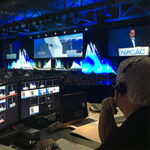
You might say that government meeting professionals are confronting a challenging landscape. This year, as the debate about the sequester intensified:
In February, a San Francisco TV station reported that, at a time when the United States Postal Service “is bleeding money and drastically cutting services,” the USPS would be spending $2 million to send 400 employees — including the Postmaster General — to the 2013 National Postal Forum (NPF) in San Francisco on March 17-20. When The Washington Times picked up the story, its headline pulled no punches: “Broke U.S. Postal Service paying $2M for conference, golf, party.”
That’s not how the meeting’s organizers see it. “Everyone that comes to the meeting is invested in the mail,” Maureen Goodson, NPF’s executive director, told PCMA News. “This is where the real dialogue about how to move the mail business forward occurs.”
Later in February, the U.S. House of Representatives Committee on Oversight and Government Reform convened a hearing on “The Road Less Traveled: Reducing Federal Travel & Conference Spending.” The committee’s chair, Rep. Darrell Issa, set the tone with his introductory remarks: “For fiscal year 2012 alone, there were over 750 conferences that cost in excess of $100,000. The total cost to the taxpayers for these events was more than a quarter of a billion dollars.
“With the looming $85-billion across-the-board sequester spending cuts, and the administration’s unwillingness to offer specific cost-saving measures,” Issa said, “today’s hearing offers us an opportunity to hear how [the Office of Management and Budget’s 2012] directive [limiting federal spending on travel and conferences] — if fully and responsibly implemented — can potentially help save the taxpayer’s billions of dollars by reducing travel and conference costs that may not be necessary for a federal employee to discharge the duties of their office.”
Among those testifying at the hearing was Cynthia Metzler, GSA’s chief administrative services officer, who outlined new policies that GSA has enacted to “reduce costs, provide strong oversight, and ensure that travel only occurs when necessary.” She added: “Conferences can no longer be held without submission of a detailed justification, a proposed budget, and review and approval from multiple divisions. At minimum, this means any conference, no matter the proposed cost, is reviewed both by the head of the relevant division and GSA’s Chief Administrative Services Officer (CASO).”
In March, GSA announced that it was canceling its 2013 Training and Expo conference, scheduled for May 14-16 in Orlando. The conference, which is “designed for federal, state, and local government employees and military members who manage programs or influence and make acquisition decisions,” was facing decreased attendance from federal employees whose agencies were bracing for the sequester’s automatic spending cuts, according to The Washington Post.
In a statement on the Training and Expo website, GSA said: “The GSA Training and Expo has provided a valuable forum for our partners to receive acquisition training. Expo has also created opportunities for government and industry to interact for the benefit of the American people.
“However, in the current fiscal climate, agencies and businesses alike have been forced to make tough spending cuts. After carefully reviewing the projected spending and attendance for this year’s conference, GSA is suspending Expo for 2013 in an effort to use our resources responsibly and to deliver better value and savings for our government partners, our vendors, and the American people.”
Also in March, The Wall Street Journal ran an unsigned editorial blasting the U.S. Department of Agriculture’s sponsorship of two upcoming meetings — the California Small Farm Conference, held in Fresno on March 10-12, and the Priester National Health Extension Conference, scheduled for April 16-17 in Corvallis, Ore. “Yes, even as the White House warns that the modest automatic spending cuts will force the furlough of meat inspectors, two divisions of the Agriculture Department will underwrite the 26th California Small Farm Conference in Fresno next week,” the Journal wrote. “The event will feature USDA speakers, field trips, a banquet, and a tasting reception, according to the conference website. Conference organizers promise the tasting will be a ‘mouthwatering event’ featuring ‘fine wines and exceptional microbrews paired with seasonally driven culinary delicacies.’ How can we sign up?”
Not to be outdone in taking umbrage, longtime meetings industry advocate Roger Rickard, a partner with Revent, fired back a letter to the editor, which he also posted on his Voices in Advocacy blog: “The conferences cited in your editorial identified key objectives to their success, [such as to] ‘provide resource support to professionals and community leaders working to improve community health.’ It’s not about the wine or the tasty dishes, however it is about achieving key objectives. Face-to-face conferences allow people to remove themselves from their daily routine and completely focus on the topic at hand to advance their knowledge and expertise.”
Watch this space for continuing updates on the GSA Effect. We’re sure you won’t have to wait long.
What Does SGMP Think?
In many ways, government meeting professionals are caught in the middle of this situation — trying to organize interesting, educational programs within increasingly tight constraints. We checked in with Rob Bergeron, CAE, CGMP, executive director and CEO of the Society of Government Meeting Professionals (SGMP), about what his members are facing.
How would you describe the market for government meetings?
The government market remains under significant scrutiny right now. Our planner members are under pressure and our supplier members are uneasy. But cost-effective government meetings play an important role in the industry.
What are you hearing from your members about the effects of the sequester?
We continue to hear of federal meetings being scaled back or canceled, and the sequester has added even more pressure on the market.
Is government reaction to last year’s controversy over GSA conference spending still something that government meeting planners are dealing with?
We certainly are still dealing with that. As are the national and local economies which are so adversely affected by the kneejerk loss of cost-effective meetings that provide important professional training to government employees.
What’s your outlook for the government meetings market in the coming year?
It was an encouraging sign in a recent hearing when a key committee chairman stated that this was not an indictment of government meetings, but an investigation into spending practices. There was a new tone from Congress that acknowledged the value of face-to-face meetings. We look to continue to build on that momentum.



